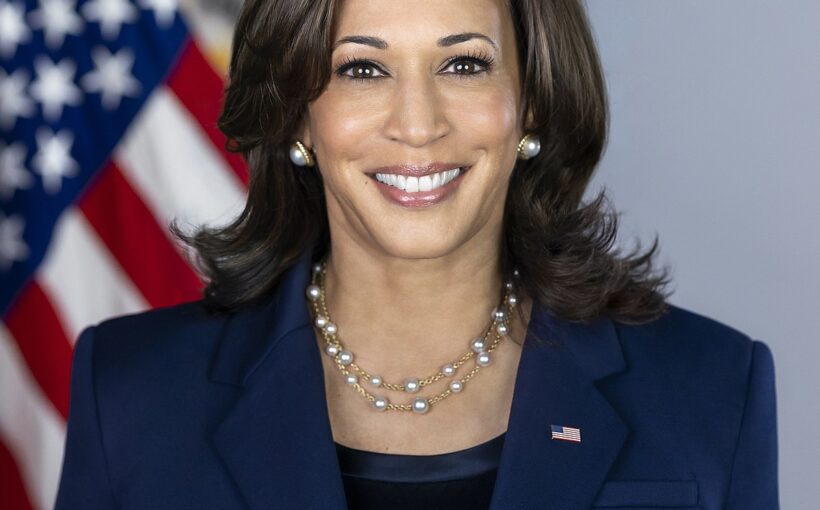Since Kamala Harris became the presumptive Democratic Party nominee to go head-to-head with Donald Trump in November’s presidential election, interest in the US vice-president has skyrocketed. Where’s she from, what’s her background, what sort of food does she eat, what are her tastes in books, films and music?
So it’s no surprise that a video showing Harris emerging from a record store in Washington DC has recently gained massive traction on social media. The footage, taken in May 2023, shows her engaging with journalists while displaying and talking about the records she had purchased. This video clip was notably shared and reposted among the European jazz community – not people you’d necessarily think would be hugely interested in the musical tastes of US presidential candidates.
Harris’s purchases included three classic jazz albums by notable African American artists: Charlie Mingus’s 1972 album Let My Children Hear Music, Roy Ayers’ 1976 Everybody Loves the Sunshine, and the 1959 collaboration of Ella Fitzgerald and Louis Armstrong on Porgy and Bess.
Unsurprisingly, this kicked off something of a media buzz. In the US, Billboard magazine put together a list of ten of Harris’s “best musical moments”, hinting they might give us a clearer picture of her political beliefs and aspirations, while The Philadelphia Inquirer asked: “Will Kamala Harris make history as the President with the coolest musical taste?”
In the UK, The Times ran a story under the headline: “Kamala Harris is a jazz lover — ain’t that a kick in the head?” The video has become so popular that a website now allows you to generate an image of Harris holding the favourite album of your choice.
As with many past presidents and presidential candidates, the media’s perception of Harris can certainly be informed by her taste in, and knowledge of, music. Harris’s love for jazz is evidenced by her having been a former board member of the San Francisco Jazz Association. It suggests a correlation with her political message and persona, as someone who connects with diverse audiences, embraces African American heritage and culture, and is supportive of the arts.
Liking and knowing jazz, in some circles at least, suggests sophistication, intellectualism, and a leaning towards advocacy for cultural unity through diversity. The improvisational and creative elements found in jazz might also translate to a degree of flexibility in her politics.
This idea is supported by a sense that Harris’s political positions (as revealed thus far in her campaign) show a departure from Joe Biden’s – and a slight shift to the left within Democratic principles. In this light, her love of jazz seems to showcase Harris’s alignment with those who are the strongest advocates for a progressive and multicultural America. And this could translate into key political capital.
Recent history suggests jazz holds some cachet in American politics – see, for example, the story of Barack Obama telling his speechwriter, Cody Keenan, to play John Coltrane while writing. In 2014, Bill Clinton received the Monk Institute Award for his jazz advocacy, and more recently began his podcast series with an episode entitled: “Wynton Marsalis: How Jazz Explains Democracy”.
No accounting for taste
When Donald Trump’s Spotify playlist was recently revealed, it appeared to lack a clear sense of coherence. There was a seemingly random mix of artists including Sinead O’Connor, Johnny Cash, Andrew Lloyd Webber, the Rolling Stones, and a duet by James Brown and Luciano Pavarotti.
Interestingly, some of these (and other) artists have refused to allow Trump to use their songs at his rallies. Most recently, Isaac Hayes reached out from beyond the grave with a cease-and-desist order (issued by his estate) preventing Trump’s campaign from using his song, Hold On I’m Coming.
The inclusion of Johnny Cash on Trump’s playlist is also quite surprising, given the artist’s well-documented conflict with Republican president Richard Nixon.
In fact, the list seems so random that it might suggest that whoever compiled it was bent on reaching a large, indefinite electorate – while being somewhat deaf to the lyrics contained in these songs or ignorant of the artists’ political views.
Consistency
As teenagers and young adults (and sometimes in later life too), we often make assumptions about our peers through their tastes in music. It is the soundtrack of our tribe, the common medium through and around which we make sense of our world, and construct our individual and collective identities.
But in the case of a public figure and prospective world leader, does their choice in music tell a coherent story about who they are and what they stand for? While Trump’s Spotify list clearly shows there is no particular style or taste he favours, perhaps this is an unconscious desire to connect with as wide a range of the public as possible.
Meanwhile Harris, through her love of jazz music, is identifying with one particular genre whose Venn diagram encompasses several demographics: African American, urban, and intellectual. At first glance, this may appear limiting – but it also has the virtue of consistency.
The love of music is not necessarily an electoral strategy. But it would be interesting to find out which approach resonates most with voters ahead of the coming US election: scattergun and with no particular demographic focus, or targeted and consistent.
![]()
Haftor Medbøe receives funding from UKRI.
Jose Dias received funding from UKRI.



